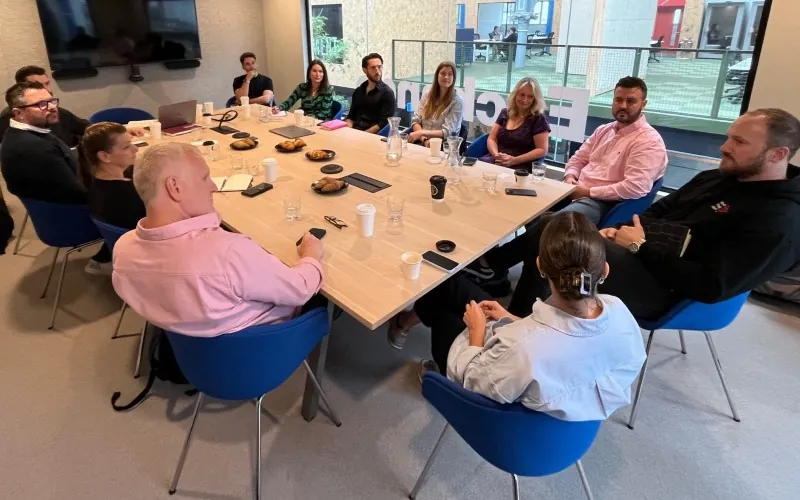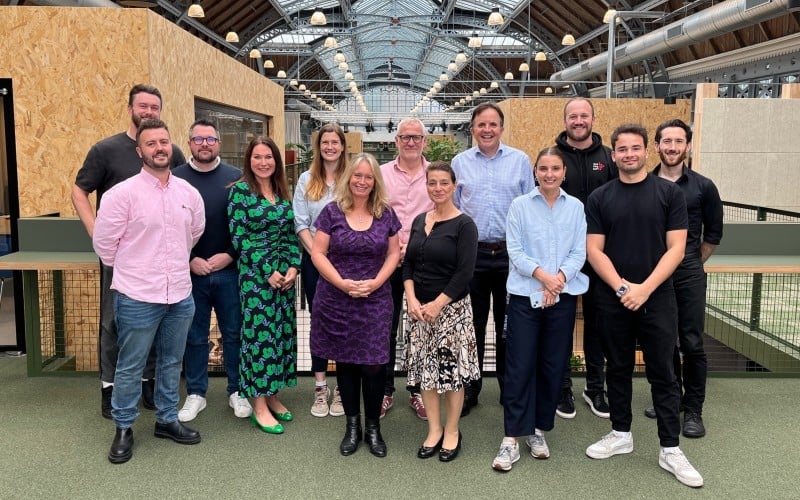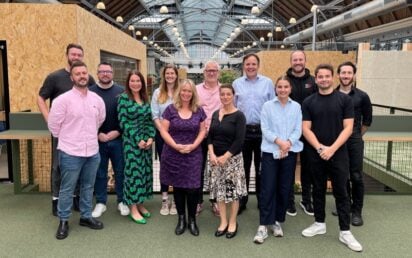BusinessCloud joined forces with GM Business Growth Hub for its latest tech roundtable discussion.
Several of the companies from our 2025 GM Rising Stars of Business list took part in the event, which was hosted at Allied London’s impressive new Campfield building in Manchester.
The imminent arrival of Generation Beta – or Gen Beta – into the workplace will mean there will soon be five different generations working side-by-side.
The attendees discussed how the different generations integrate together and the impact of AI.
Business leaders are different
Dan Rosenberg is the founder of EdTech platform LinkyThinks and said business leaders are different.
“The type of people who make startups and scaleups are resilient, agents of change. The biggest thing we’re mainly talking about is managing other people. A big talking point at the moment is automation and what that’s going to do for the jobs market.”
Don’t expect the same level of dedication
Nicola Jones is the COO of Powdr, whose financial forecasting and modelling software helps startups and SMEs to raise debt and equity.
“You can’t expect the same level of dedication from everyone that you hire. Having that as a mindset is so important. We’ve also spoken about how you think about your customers and how they need different things from you generation wise.”
Follow your gut instinct
Caroline England is the founder of Featherbed Tales, which creates digital picture books and greetings cards.
Featherbed Tales – Digital picture books and greetings cards, recorded by you
“There is quite a wide variety of of views about working with different generations. It’s about individuals and getting the right individuals. It’s also about believing in your gut instinct and making decisions and actions quickly.”
AI is a bridge between generations
Michael Lawes is the CEO of Appacut, which is a mobile barbering service. The startup recently secured £600,000 in a seed funding round from a series of high-profile business people, including musicMagpie founder Steve Oliver.
“What really struck me today is how AI can act as a bridge — not just between tasks, but between generations. At Appacut, we work with providers aged 18 to 55, and what we’re seeing is that AI has the power to level the playing field. It helps an 18-year-old learn how to operate in the industry, fast, as well as help a 55-year-old brand and polish their digital profile as well as someone who lives on Instagram.

GM Business Growth Hub roundtable at Campfield
“How to motivate younger demographics in a world of side hustles and entrepreneurialism also came up – for us, it’s about aligning incentives with more autonomy, faster growth opportunities, and meaningful responsibility. That’s how you retain ambition without boxing it in.”
I look for values before age
Markella Mikkelsen is the CEO of MolMart, which uses genomics to help individuals make informed choices about their future health by identifying their genetic risks.
“Rather than looking at different generations I look for values in people and the way they work. We could have some brilliant people, who happen to be Gen Z, millennials or baby boomers and it doesn’t so much matter about their age but their own work ethic and the way they fit into the business.”
Hire on outcomes
Jack Barmby is the CEO of Gnatta, a multichannel customer interaction company that has invested heavily in AI.
“The younger workforce want more autonomy. One of the things that we found works really well is outcomes-based hiring where we say ‘this is what we want you to do’. The culturally stuff sits underneath.”
Multi-generational workforces have challenges
Chris Townsend is the managing director of Manchester-based What Media, specialists in video production and video technology.
“Everybody is struggling with the same problems. We’ve had conversations internally about struggles that come with working with a multi-generational workforce and it’s interesting that everyone else is having the same experience.”
Businesses need to adapt to changing world
Kirk Winstanley is the COO of banking technology providerBankiFi.
“People are the most important part of our business and the hardest bit to get right and it’s our responsibility as business leaders to figure that out. We’re not going to change the culture of the working people, we have to embrace it and figure out how to adapt ourselves to it.”
Be rigorous in recruitment
Richard West is the CEO of business intelligence platform Red Flag Alert
“Be absolutely rigid in your recruitment process in terms of making sure that people meet that criteria. Don’t expect what you expect in terms of ‘are they going to bring what I bring? but they can bring attitude and energy. Those things for me are non-negotiables.”
Adapt and engage – or fail
Russell Teale is the CEO of Vivify, which helps schools hire out facilities outside teaching hours
“Whether we like it or not, the new generations are coming. We have to flex and adapt in business and the new generations coming through are no different. If we don’t adapt, embrace and learn to engage them and give them a purpose, the reality is our businesses will fail or slow down at the very least.”
Onshore vs offshore
Tanya Arturi is the digital, tech and cyber development lead of GM Business Growth Hub.
“Some of the barriers to growth are very clear. It’s really interesting about onshore vs offshore. From a younger generation point of view, quite a few people have said they bring creativity and a different way of looking at a business but perhaps they want more flexibility and side hustles and things like that. The other thing is about people working together rather than in silos and how that’s going to affect office space.”
Sarah Louise Fairburn: Disrupting the world of food and drink gifting
Proximity is good for productivity
Tanya Grady is the commercial director at Allied London, which is behind the Manchester tech and creative campus Campfield
“Proximity is really important for the productivity of teams and how we can support that through the design of our spaces.”


